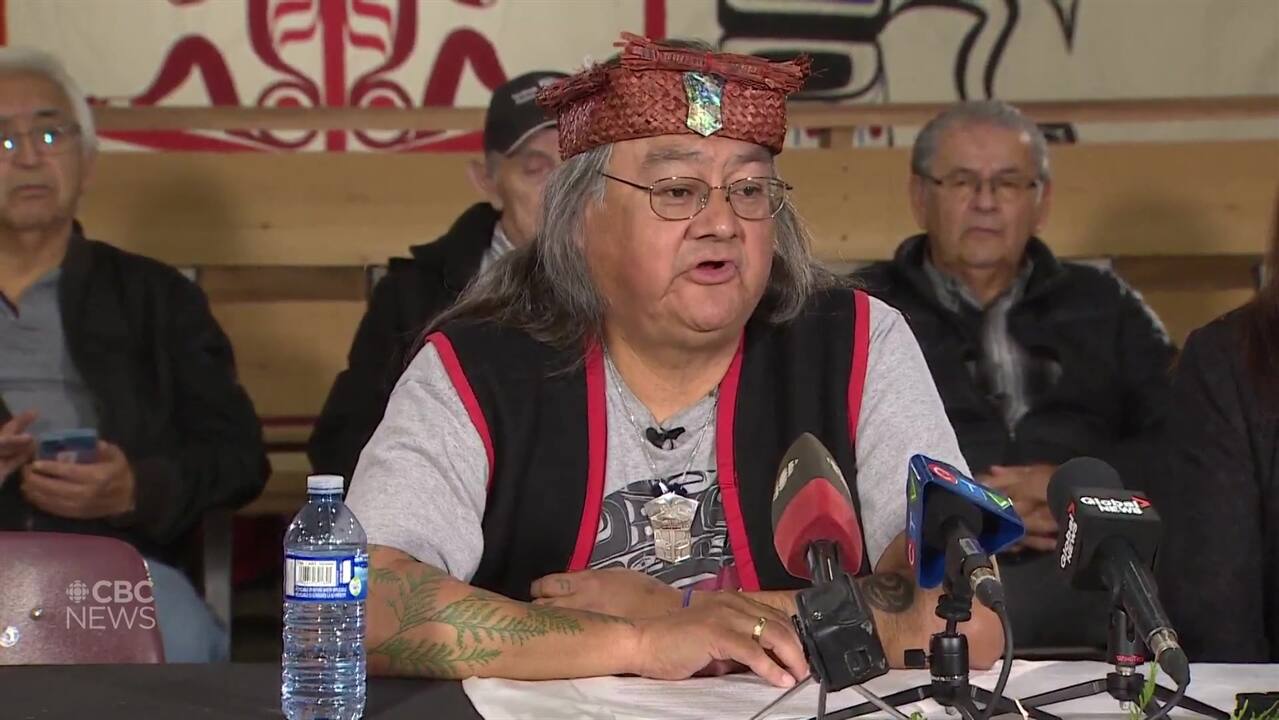Heiltsuk man, granddaughter seek further discipline for police officers who wrongfully handcuffed them | CBC News

[ad_1]
A Heiltsuk man and his granddaughter are asking British Columbia’s police complaint commissioner to reopen discipline proceedings against two Vancouver police officers who wrongfully handcuffed them in 2019.
Maxwell Johnson and his then 12-year-old granddaughter were detained outside a Bank of Montreal branch in downtown Vancouver in December 2019 after staff called police due to suspicions over their government-issued Indian status cards.
The handcuffing prompted immediate criticism of the Vancouver Police Department (VPD) and its treatment of Indigenous people. It led to a human rights settlement with police and a formal cultural apology ceremony in the Heiltsuk Nation in October 2022 — which was attended by senior VPD leadership, but not arresting officers Mitchel Tong and Canon Wong.
Johnson and his granddaughter are now applying to the Office of the Police Complaint Commissioner (OPCC) to reconsider disciplinary proceedings against the officers and compel them to visit the nation for a second reparation ceremony in Bella Bella.
The OPCC had suspended Tong and Wong in April 2022 and found the officers did not have reasonable grounds to handcuff the Johnsons.
“There is a hole in me right now,” Johnson says in the new application to the OPCC, dated Dec. 13.
“My family, my people and my culture are being disrespected and cast aside. If the constables don’t come to Bella Bella and apologize in the proper way, the hole in me, and in our community, will stay there.”
Maxwell Johnson, who was wrongfully handcuffed by Vancouver police officers, says the arresting officers’ decision not to attend an apology ceremony with the Heiltsuk Nation was deeply disappointing.
In a statement, the Heiltsuk Nation says the officers had told the OPCC they would attend the apology ceremony.
It says the fact they didn’t show up constituted evidence that “the constables will not agree to a culturally appropriate apology without being ordered to on reconsideration.”
“The Vancouver Police Board is supposed to be working with us to address systemic racism, but the ongoing failure of their constables to respect Heiltsuk legal traditions and culture, and to apologize in an appropriate way, is systemic racism in action,” said Heiltsuk Elected Chief Marilyn Slett in the nation’s statement.
At the time of the apology ceremony in October 2022, VPD Chief Const. Adam Palmer had told CBC News that the officers could not attend for personal reasons.
The new submission says the constables were ordered to provide a written apology to the complainants, and did so.
It also says there was an offer to apologize in person, but the officers were not “compelled” to do so.
“The application is now before the Office of the Police Complaint Commissioner. In order to protect the integrity of the OPCC’s process, it would be inappropriate to comment,” said Vancouver Police Board vice-chair Faye Wightman.
CBC News has contacted the OPCC for comment.
Nation cites UNDRIP in making case
As part of the settlement in the human rights case, the Vancouver Police Board formally admitted officers discriminated against Johnson and his granddaughter based on their Indigenous identities.
They also paid damages to the Johnson family and donated $100,000 to the Heiltsuk First Nation, as well as promised to hire an anti-Indigenous-racism officer, who was to look into complaints relating to Indigenous people.
The Heiltsuk Nation says in its statement they have attempted to arrange another apology ceremony, including by talking to Vancouver Mayor Ken Sim, who chairs the police board. It says those efforts have not paid off.
In the statement, the nation says policing agencies have an obligation to address systemic biases in policing under the province’s Declaration on the Rights of Indigenous Peoples Action Plan.
“When a member of the Heiltsuk Nation suffers harm and discrimination, it impacts the whole community,” reads the statement.
“A Heiltsuk apology ceremony, attended by the constables, would be a positive, uplifting and healing experience for everyone involved. It would be reconciliation in action.”
Anyone can apply to the OPCC to reconsider previous disciplinary cases if new evidence is provided, under the provincial Police Act.
In this case, the new evidence is cited as two affidavits, one from Johnson and another from Slett, which detail events that happened after the OPCC’s sanction decision.
“The evidence demonstrates the constables represented their willingness to attend an in-person apology with the complainants to the discipline authority, but that their representation was either untrue or abandoned,” the submission reads.
“The disciplinary or corrective measures imposed based on that misrepresentation should therefore be reconsidered.”
[ad_2]
